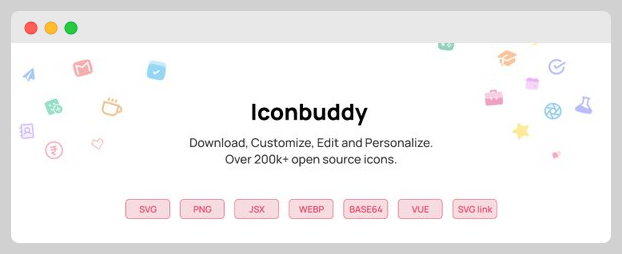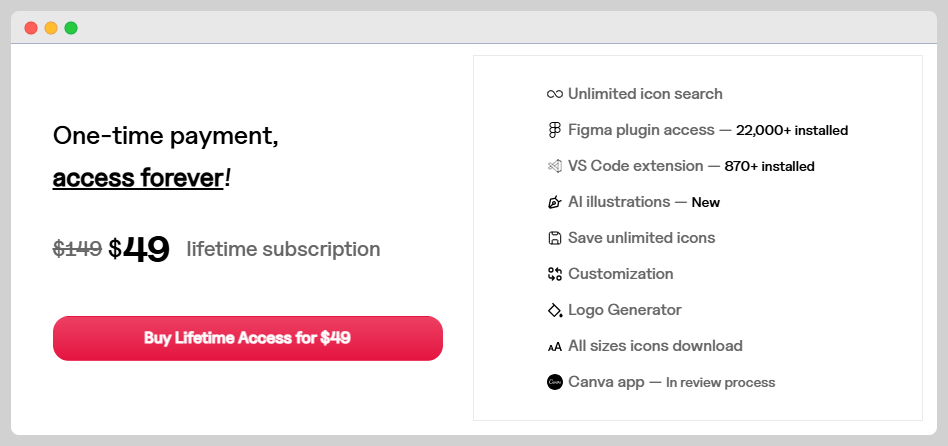How Danish Yusuf Turned Icon Search Tool Into $72K ARR in 8 Months
Who is Danish Yusuf?
Mohd Danish Yusuf, from India, acquired Icon Buddy in 2023 and transformed it from a zero-revenue project into a successful business using his tech skills and marketing strategies; he shares insights on his entrepreneurial journey online.
What problem does Icon Buddy solve?
Icon Buddy makes it easy for designers to find high-quality SVG icons quickly, saving them from the tedious and time-consuming task of searching through countless sites.

How did Danish come up with the idea for Icon Buddy?
Mohd Danish Yusuf stumbled upon the foundation of Icon Buddy when Fayaz Ahmed approached him with an offer to purchase the project. Despite there being no revenue or traffic at the time, the core idea of having a robust, searchable database for icons caught Danish's attention. Observing the unmet need within the design community for an efficient way to search high-quality SVG icons, Danish saw potential where others hadn't.
After acquiring the project, Danish sought validation through a launch on Product Hunt, which confirmed the demand with a positive response. Listening to feedback and recognizing the needs of designers, he refined the offering by developing features like a Figma Plugin, making the product more integrated into designers' workflows. Along the way, he faced challenges like monetizing a free resource, but through experimentation with pricing models and licensing options, he discovered a sustainable path forward.
The entire journey taught Danish the importance of perseverance and continuous iteration. By focusing on adding value and understanding user needs, he successfully turned an underutilized concept into a valuable resource that designers were willing to pay for.
How did Danish build the initial version of Icon Buddy?
Icon Buddy's development began with the acquisition of an existing project built in Vue.js, and Mohd Danish Yusuf revamped it using a more comfortable tech stack. The platform evolved to become a search engine for over 226,377 open-source icons, utilizing Algolia for efficient search capabilities. The initial version of the revamped product took a few months to develop, during which Danish faced the challenge of integrating and indexing a vast library of icons from various sources. He added value through the development of accompanying tools, such as a Figma Plugin and a VS Code Extension, which reached 20,000 and over 300 installs respectively. The product went through four iterations to improve the user interface, reflecting the difficulties in creating a seamless design experience.
What were the initial startup costs for Icon Buddy?
- Acquisition: The founder acquired Icon Buddy for $4,000.
- Domain Purchase: The .com domain for Icon Buddy was later purchased for $3,999.
How did Danish launch Icon Buddy and get initial traction?
Product Hunt Launch
Icon Buddy was initially launched on Product Hunt to gauge interest. This launch proved quite successful, with the product securing 745+ upvotes and becoming the product of the day. Although this did not generate immediate revenue, it significantly increased the visibility of Icon Buddy and validated the concept.
Why it worked: Product Hunt is known for drawing attention from early adopters and tech enthusiasts. By getting featured prominently, Icon Buddy was able to leverage an engaged audience, which built credibility and awareness around the product from the get-go.
Figma Plugin Development
Recognizing the needs of designers, the founder developed and released a Figma Plugin for Icon Buddy. This Plugin became a trending feature, gaining 4,000+ installs within just a single month. The functionality allowed designers to access icons directly within their design software, enhancing usability and convenience.
Why it worked: Designers are the primary audience for Icon Buddy, and providing a direct integration into a popular design tool like Figma meant that users could easily incorporate the service into their existing workflow. This not only drove initial engagement but also validated the willingness of users to incorporate Icon Buddy into their daily tasks.
Pricing Strategy and Email Reminders
To convert the growing interest into sales, Icon Buddy initially charged a one-time fee of $49 for lifetime access to the Figma Plugin and web search features. After selling 46 licenses, the price was strategically increased to $69, initially offering a hefty discount to attract more buyers. Over time, adjustments were made to $89 with regular email reminders sent to highlight the ongoing lifetime deals. This approach resulted in 117 licenses being sold at $69 and 18 at $89 over a short period.
Why it worked: The tiered pricing strategy combined with targeted email marketing effectively communicated the value proposition to potential customers. The use of discounts created urgency, encouraging quick purchases. Regular emails kept Icon Buddy top-of-mind, converting interest cultivated during the Product Hunt launch into actual sales.
Organic Growth and Social Media Presence
Besides structured marketing efforts, Icon Buddy also experienced organic growth by being featured on platforms like Hacker News, Reddit, and Twitter, where it achieved significant visibility. These organic mentions resulted in increased traffic and user registrations without additional marketing spending.
Why it worked: Platforms like Hacker News and Reddit are tech-centric communities that value innovative tools. Positive exposure on these forums can lead to viral sharing and engagement. Combined with a strategic use of Twitter to engage and update followers, Icon Buddy tapped into natural online networks that expanded its customer base.
What was the growth strategy for Icon Buddy and how did they scale?
Product Hunt
Icon Buddy initially validated their idea by launching on Product Hunt, where they became the product of the day with over 745 upvotes. This high visibility generated significant interest and engagement from users who frequent the platform looking for innovative products.
Why it worked: Product Hunt attracts a tech-savvy audience eager to discover new solutions, making it an ideal launchpad for generating initial buzz and feedback. The upvotes helped boost credibility, drawing attention to Icon Buddy without incurring any significant marketing expenses.
Pricing Strategy and Email Marketing
After validating interest, Icon Buddy employed a smart pricing strategy, initially offering a $49 lifetime subscription, which later increased incrementally. They consistently engaged their audience through weekly emails, reminding them about ongoing deals and encouraging conversions.
Why it worked: This approach created a sense of urgency and exclusivity around the lifetime deal, enticing those hesitant about recurring fees. Regular emails kept potential customers informed and engaged, leading to increased sales as the product's value proposition resonated with users.
Social Media and Communities
Icon Buddy gained traction through strategic launches in Facebook groups, particularly those dedicated to lifetime deals (LTD). This move tapped into communities specifically interested in one-time purchases, significantly boosting sales during the months of active promotion.
Why it worked: By targeting niche communities with a high propensity to engage in one-time purchase deals, Icon Buddy effectively reached audiences likely to act on these offers. The tailored messaging and right community fit turned social media into a powerful sales channel for the business.
Search Engine Optimization (SEO)
Investing in SEO to increase visibility on search engines was another critical strategy. Icon Buddy ensured their 200k+ pages were indexed by using tools to get them indexed faster, improving search result visibility.
Why it worked: A robust SEO strategy ensured that potential customers looking for specific icons could easily find Icon Buddy's vast library. By making their content searchable, they attracted a continuous stream of organic traffic interested in their offerings without ongoing advertising costs.
What's the pricing strategy for Icon Buddy?
Icon Buddy offers a lifetime subscription @ $49, with seasonal offers.

What were the biggest lessons learned from building Icon Buddy?
- Monetize What Saves Time: Icon Buddy's success came from realizing that people are willing to pay for solutions that save them time, like their lifetime access plans. Understanding your product's value in relieving pain points can drive sales.
- Iterate Based on Feedback: Danish constantly iterated on Icon Buddy's website and features, adapting each time to enhance user experience and meet demand. Feedback is crucial for refining your product and staying relevant.
- Organic Growth is Powerful: The business grew its user base and revenue significantly through organic channels such as community groups and social media, proving cost-effective marketing can be very successful if done strategically.
- Experiment with Pricing: By testing different pricing strategies, Icon Buddy found effective ways to boost sales. Testing pricing can help you find the sweet spot where customers feel comfortable and perceive value.
- Be Tenacious and Adaptable: The journey wasn't always smooth, but sticking with the project and continuously searching for solutions led to eventual success. Resilience is key in navigating the ups and downs of entrepreneurship.
Discover Similar Business Ideas Like Icon Buddy
Page Flows is a library of inspiration videos for digital product designers and makes about $4,500 per month in revenue from a small, one-off price, with slow and steady growth and long-tail keyword SEO as key drivers of success.
An Argentinian Product Designer created ResumeMaker.Online, a WYSIWYG web app that has been downloaded over 700,000 times and averages more than $2,000 a month after the recently introduced v2.0.
More about Icon Buddy:
Who is the owner of Icon Buddy?
Danish Yusuf is the founder of Icon Buddy.
When did Danish Yusuf start Icon Buddy?
2023
What is Danish Yusuf's net worth?
Danish Yusuf's business makes an average of $6K/month.
How much money has Danish Yusuf made from Icon Buddy?
Danish Yusuf started the business in 2023, and currently makes an average of $72K/year.

Download the report and join our email newsletter packed with business ideas and money-making opportunities, backed by real-life case studies.

Download the report and join our email newsletter packed with business ideas and money-making opportunities, backed by real-life case studies.

Download the report and join our email newsletter packed with business ideas and money-making opportunities, backed by real-life case studies.

Download the report and join our email newsletter packed with business ideas and money-making opportunities, backed by real-life case studies.

Download the report and join our email newsletter packed with business ideas and money-making opportunities, backed by real-life case studies.

Download the report and join our email newsletter packed with business ideas and money-making opportunities, backed by real-life case studies.

Download the report and join our email newsletter packed with business ideas and money-making opportunities, backed by real-life case studies.

Download the report and join our email newsletter packed with business ideas and money-making opportunities, backed by real-life case studies.

